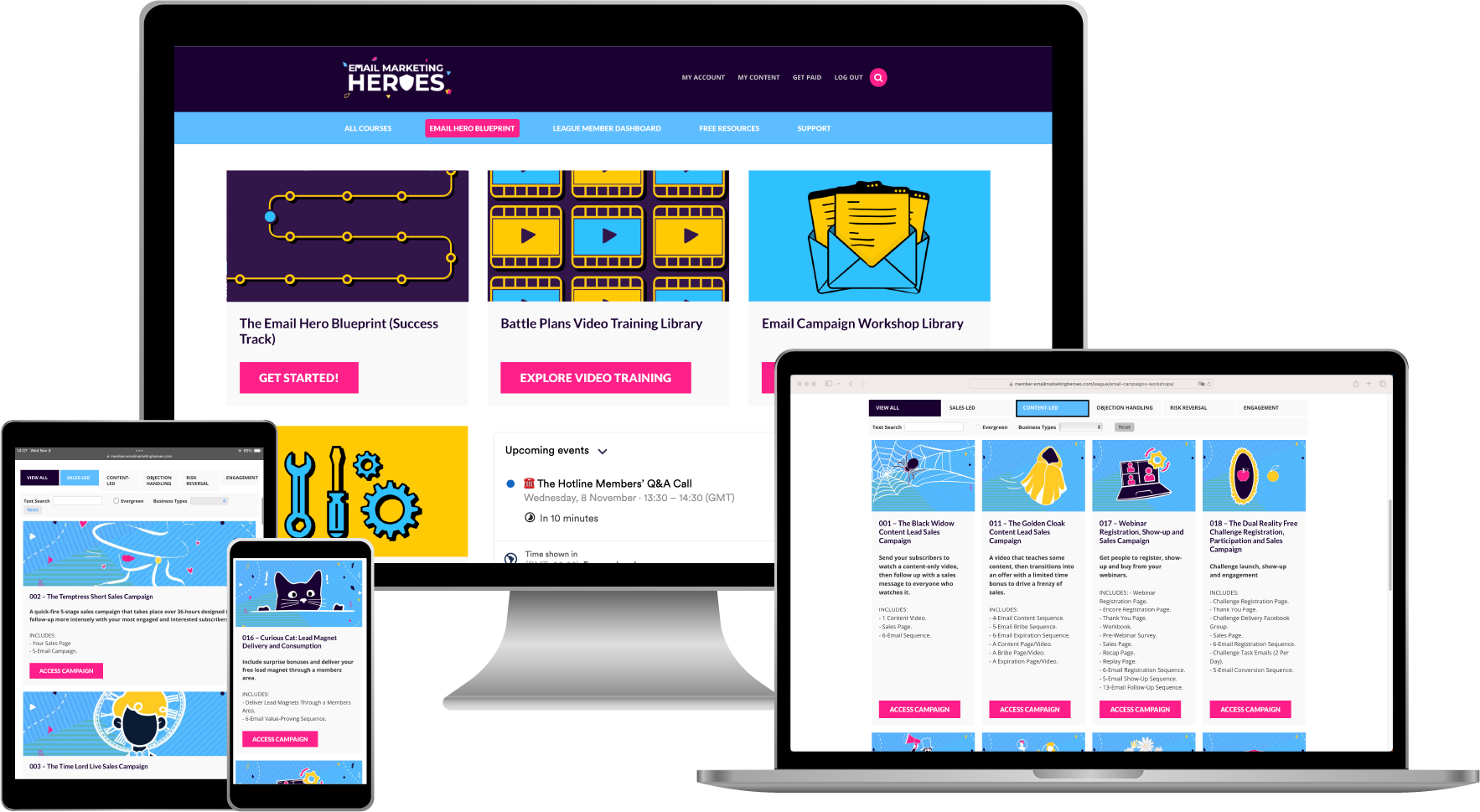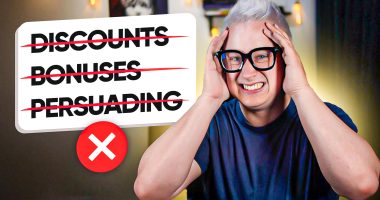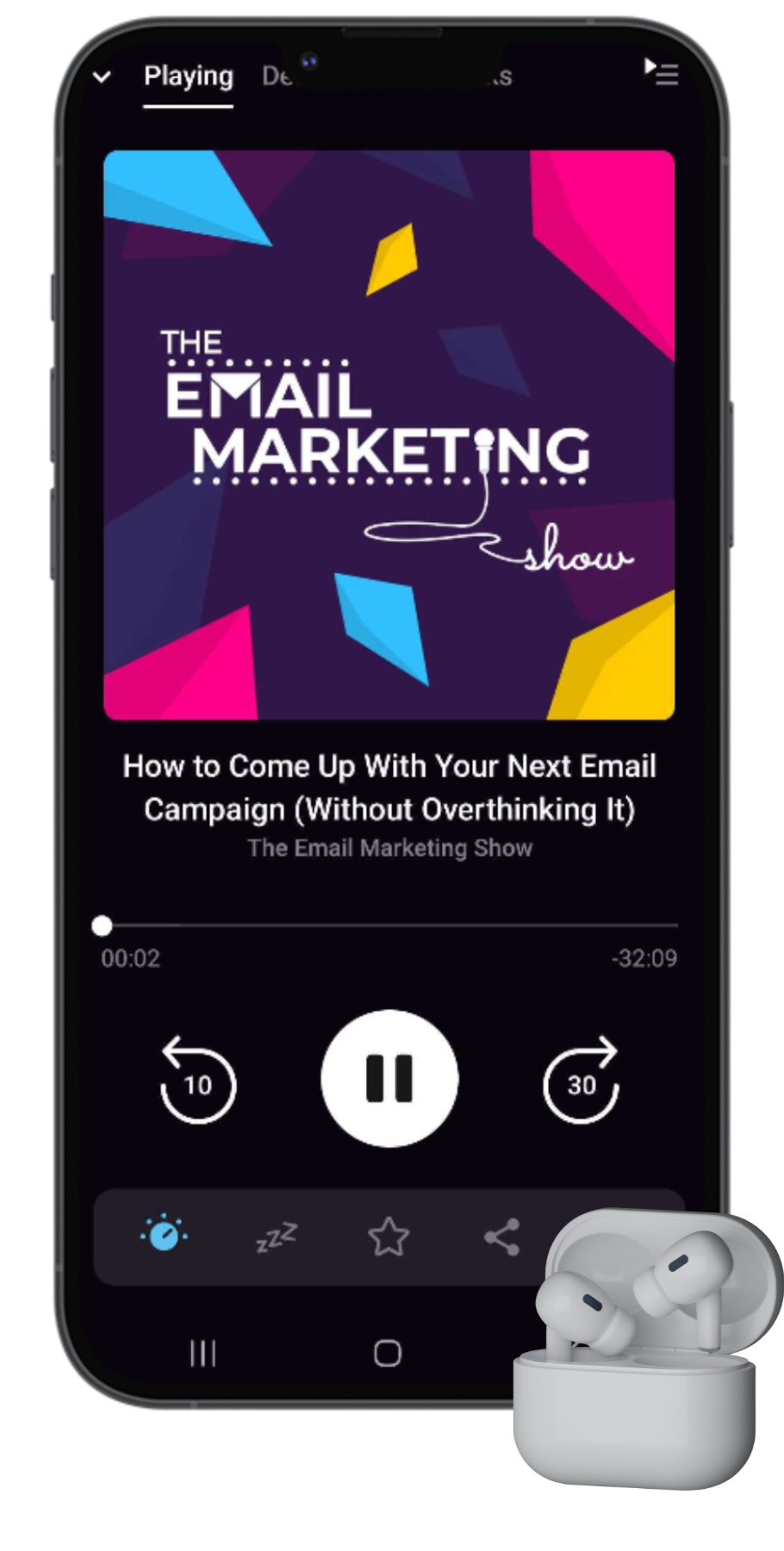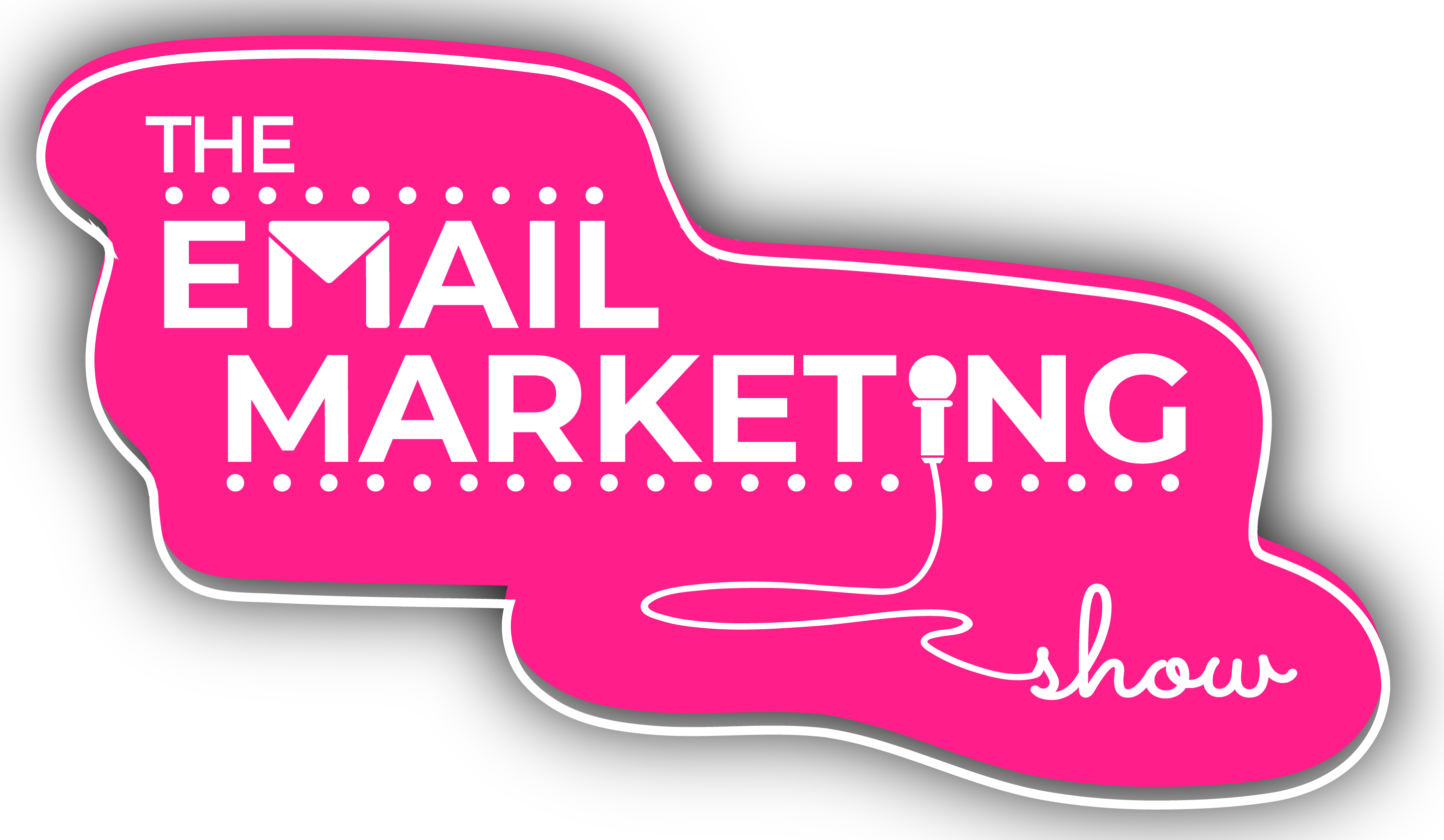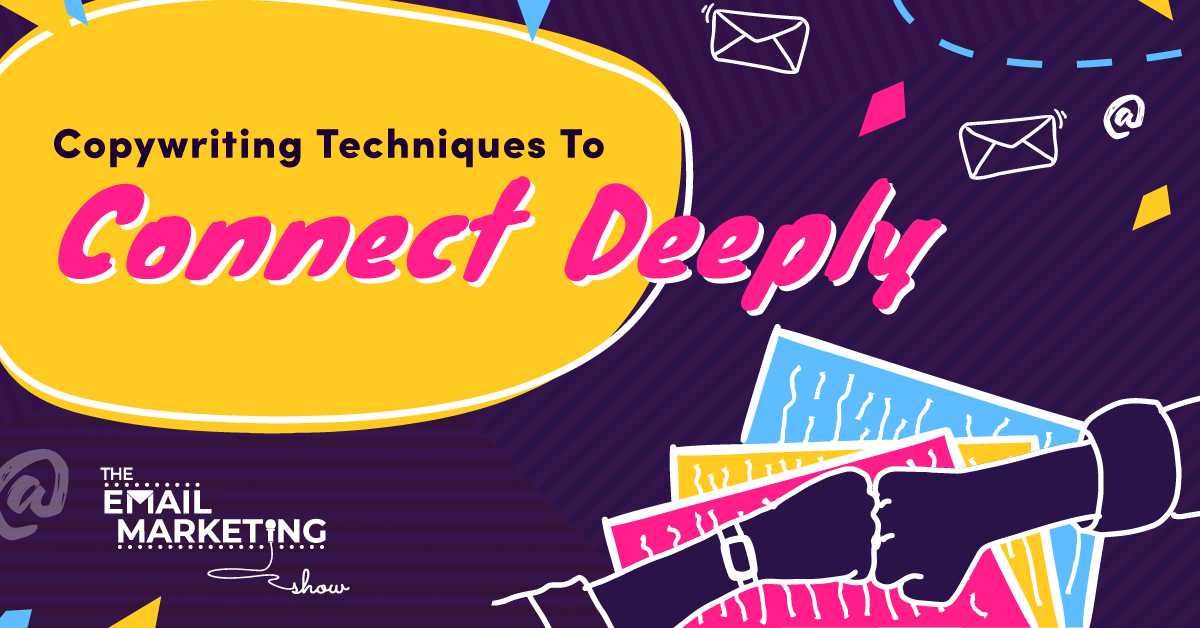
Mindblowing Techniques To Connect More Deeply With Your Email Readers With Rob Marsh & Kira Hug
How do you connect more deeply with your audience when sending out emails? Rob Marsh and Kira Hug from The Copywriter Club tell us all about the persuasive copywriting techniques that professionals use in order to build and maintain strong relationships with their email readers.
And you can start using these techniques too. Straight away!
Ready to take notes?
SOME EPISODE HIGHLIGHTS: (0:17) Join our FREE Facebook Group. (2:27) Did Kira really eat a hamster once? (4:31) The importance of using your real voice. (7:36) The persuasion technique called LIKING. (12:41) The persuasiong technique called SIGNIFICANCE. (15:43) When should you add persuasion techniques to your writing? (17:38) Do persuasive techniques only work in email marketing? (18:47) The persuasion technique of ANCHORING. (20:35) Building trust with your audience. (21:45) Subject line of the week with Rob Marsh and Kira Hug.
The importance of using your real voice
Rob and Kira help people become copywriters or improve their copywriting skills, and a huge part of that is teaching people how to connect with their audience. Because if you’re not establishing a strong connection with your subscribers and are just throwing copy into the wild, people are going to ignore you!
So the first thing we all need to do in order for people to feel the emotion coming through their screens when they read our emails is to create a brand voice that reflects the way we talk. That means not polishing yourself to sound like a super sleek marketer. Because who would trust that person? Instead, pull your own voice into the copy. And to do that, you want to almost imagine you're dictating an email to yourself.
This also means not worrying too much about misspellings and grammatical mistakes. Because guess what? Most people won't notice. And those who will might reply back to point out an error, which is good for you because it creates engagement. And engagement with your emails tells Gmail and the other platforms that your emails are worth reading and responding to. In other words, you're increasing your credibility as an email sender!
And that's why copywriters and marketers sometimes make mistakes on purpose in order to generate that engagement. At the end of the day, if you're delivering value, typos shouldn't matter that much.
The persuasion technique called LIKING
Robert Cialdini, in his book “Influence: The Psychology of Persuasion” talks about the technique of liking. You help people liking you through exposure and repeatedly showing up and sharing personal details. This helps people connect with you.
For example, we (Rob and Kennedy) do this by sharing personal facts about ourselves at the start of each podcast episode. And people tend to remember those about us.
Another example is that Rob Marsh had a lot of responses when he shared about his mother passing away. Of course, it doesn't have to be something as deep as personal as that – the time he shared about giving up Coke Zero worked just as well. Sharing personal details helps you create personal connections, which is vital because people buy from people they like and trust.
Evoking nostalgia and using pop culture
When it comes to sharing personal details, think about putting boundaries in place that you’re comfortable with so you don't suddenly feel completely vulnerable and exposed to the world. You might not be comfortable sharing something as deep and meaningful as a personal loss, so Kira recommends you think about things that evoke nostalgia.
To do that, you can use pop culture. If you mention The Simpsons in an email, for example, people don't need to be super fans to be able to get your reference. For the most part, they'll be aware of the show. And as soon as you start talking about something that everyone knows about, you open a doorway for people to come in quickly and connect with you. And that's very different from sharing a personal story about when you were 10 years old that you might not be too comfortable talking about.
It's not even about whether people agree with you or not – all that matters is that they understand the reference. Because that's what helps you build the relationship. And it doesn't even need to be something super significant – it could be something as small as sharing someone's birthday. That is enough to create a connection with someone.
So when sharing personal details and stories about yourself, put barriers around the things that are part of your world that you don't want to talk about. You can choose what you talk about and not talk about with your audience.
The persuasion technique called SIGNIFICANCE
Another copywriting technique Rob and Kira recommend is significance. This helps the person you’re talking to feel they’re important. So when you create any type of copy, make your audience feel like you understand and empathise with what they're going through.
A way to apply this is by using flattery. This works because when you say something good about a person (even when they know you might be insincere or have an ulterior motive) it increases their liking of you. So think about anything you can write in your emails to help your readers feel significant, heard, and important. Because that helps you connect more deeply with your audience.
Kennedy did a lot of research around flattery (due to his line of work as a Psychological Mind Reader), and a cool trick anyone can use to go beyond ‘bland flattery' is to tell the person why you admire them or you’re paying them a compliment – it makes what you say feel more believable and ‘solid'.
When should you add copywriting persuasion techniques into your writing?
Should these persuasion techniques be embedded in the writing process from the start or can they be sprinkled on at the end? Kira explained that she will often start with some of these persuasion techniques, especially in order to create a pattern interrupt for people.
Because we live in a busy world with a lot of messages coming from all directions, we need to constantly think about how we’re going to grab the attention of our readers (and get them to open and read our emails). So sometimes you have to start your emails with these techniques.
However, details like flattery or adding specific details around nostalgia or pop culture can be inserted later, unless they’re the very theme of the email, in which case you might want to start from there.
The good news is that the more you do it, the more natural this becomes. You start thinking about the person you're writing to and the things you can share. And especially with email (unlike a sales page), you can use these techniques over the course of several emails. You may use more liking in one email and more significance in the next.
Over time, using these techniques helps you deepen the connection with your audience. And if you ever notice you're starting to sound like every other business owner or marketer, it's time to pump up your voice so you can better hold people's attention.
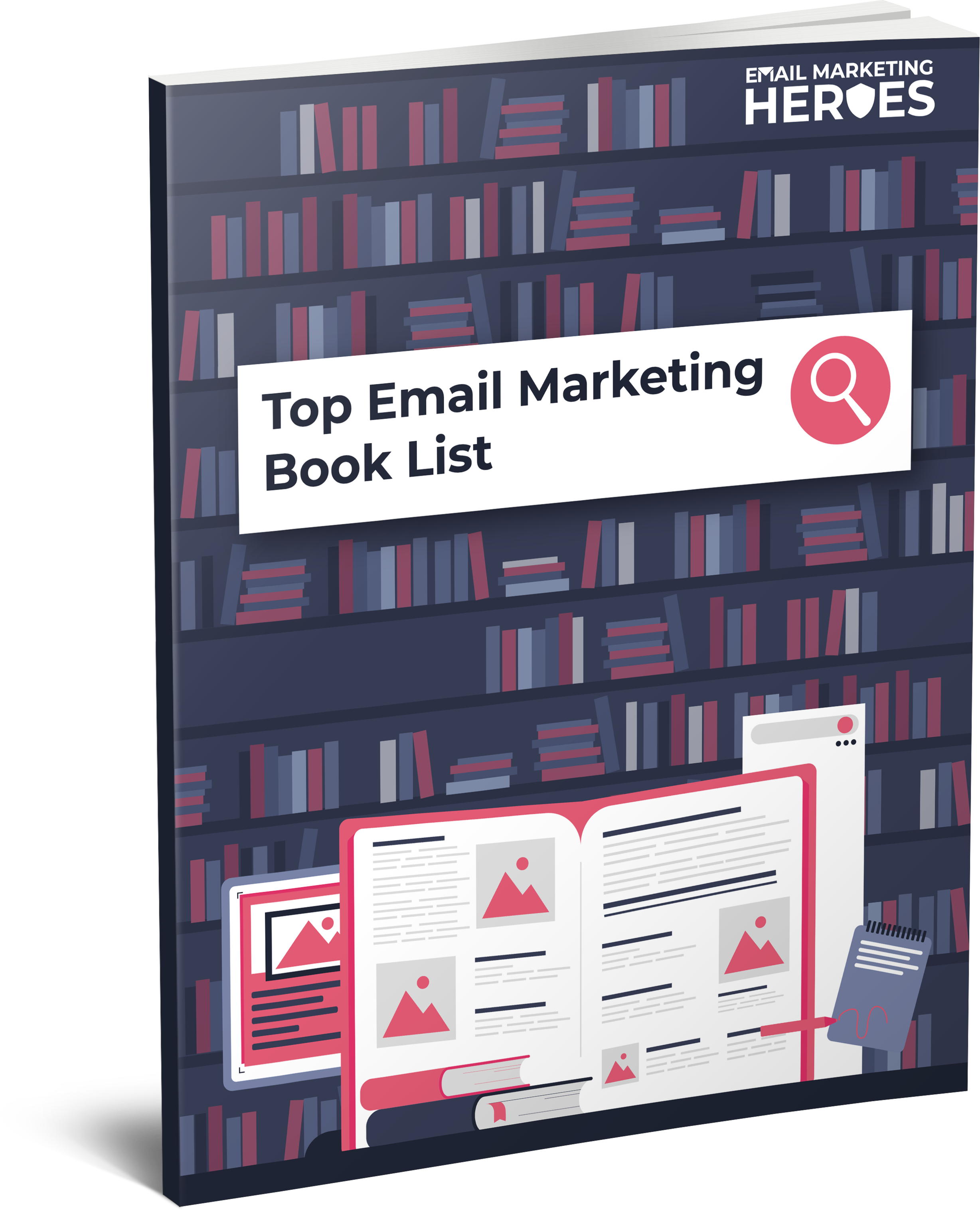
The Top 10 Books To 'Power Up' Your Email Marketing
10 book recommendations that will improve all areas of your email marketing (including some underground treasures that we stumbled upon which have been game-changing for us).
Do persuasive copywriting techniques only work with email marketing?
Email marketing is brilliant and unique in the way it’s personal. Because even though you may be writing an email and sending it out to many people, it’s a one-to-one type of communication for the person receiving it. So using techniques such as liking, significance, or even anchoring (more on that below) can have a bigger impact when used in email marketing than it does in other types of communication (such as a sales page, for example).
So this is a definite advantage that email has over other types of communication. Plus, because it’s constant and regular, and you're present every day, it allows you to build rapport over time. A sales page, on the other hand, is a one-off piece as it's rare that someone comes back to a sales page day after day.
The persuasive technique of ANCHORING
Anchoring is the idea of attaching whatever you’re talking about to something else the audience is already familiar with. It’s most commonly talked about in the context of pricing, but it’s broader than that.
For example, if you want to make your product seem valuable you anchor it to something that’s perceived as valuable, such as a Rolls Royce. Equally, if you want to position it as something everyone can afford, you can associate it with Walmart.
Anchoring allows you to attach your product with ideas that people already have in their heads so the value they associate with the other thing is automatically translated to your product too. It helps you give your offers relative value, and it's a great technique to frame your products and to use in your email marketing.
Building trust with your audience
And finally, another useful technique is building trust. You always need to understand the stress levels of the audience and ‘read the room'. What is someone dealing with in their minds and in their lives while reading your emails?
We often talk about relevancy as well. If you write an email to someone who's dealing with conflict in their country, but you completely miss the mark and fail to acknowledge what's going on for them, there's a good chance you'll lose that person, and they won't come back.
If you're not mindful about using the right persuasive techniques at the appropriate time you could lose people. So be aware of what's going on in your audience's world so you can build trust with them.
Subject line of the week with Rob Marsh and Kira Hug
This week we have two subject lines! Rob Marsh’s favourite subject line is “That will be $27,000. Oh, and bring cash”, she said. The reason why this worked well is that it sounds like the beginning of a story. There’s an immediate hook here where the reader is wondering what’s happening. Plus, the number catches their attention – it’s a big number, especially coupled with the phrase “bring cash”. Because $27,000 in cash is a lot of notes! The subject line worked because it's intriguing.
And Kira’s favourite subject line is “That time I tied up Rob…” We feel this one needs no explanation – it worked because it obviously creates intrigue. No wonder Rob and Kira had a decent open rate on that one, right?
Useful Episode Resources
About Rob Marsh and Kira Hug
If you want to connect with Rob and Kira, you can find them on their website or their free Facebook group or you can check out their podcast, The Copywriter Club podcast. And if you head over here, you'll find a checklist of 27 different persuasion techniques for you to download and include in your own writing.
Related episodes
Making Yourself Choosable with Belinda Weaver.
Little Tricks to Write Better Emails That Aren’t Boring.
The Therapeutic Benefits of Writing Your Own Emails.
FREE list of the top 10 books to improve your email marketing
If you want to write better emails, come up with better content, and move your readers to click and buy, here's how. We put together this list of our Top 10 most highly recommended books that will improve all areas of your email marketing (including some underground treasures that we happened upon, which have been game-changing for us). Grab your FREE list here.
Join our FREE Facebook group
If you want to chat about how you can maximise the value of your email list and make more money from every subscriber, we can help! We know your business is different, so come and hang out in our FREE Facebook group, the Email Marketing Show Community for Course Creators and Coaches. We share a lot of training and resources, and you can talk about what you're up to.
Try ResponseSuite for $1
This week's episode is sponsored by ResponseSuite.com, the survey quiz and application form tool that we created specifically for small businesses like you to integrate with your marketing systems to segment your subscribers and make more sales. Try it out for 14 days for just $1.
Join The League Membership
Not sick of us yet? Every day we hang out in our amazing community of Email Marketing Heroes. We share all of our training and campaigns and a whole bunch of other stuff. If you're looking to learn how to use psychology-driven marketing to level up your email campaigns, come and check out The League Membership. It's the number one place to hang out and grow your email marketing. Best news yet? You can apply everything we talk about in this show.
Subscribe and review The Email Marketing Show podcast
Thanks so much for tuning into the podcast! Thanks so much for tuning into the podcast! If you enjoyed this episode (all about persuasive copywriting techniques you can use in your email marketing) and love the show, we'd really appreciate you subscribing and leaving us a review of the show on your favourite podcast player.
Not only does it let us know you're out there listening, but your feedback helps us to keep creating the most useful episodes so more awesome people like you can discover the podcast.
And please do tell us! If you don't spend time on email marketing, what do you really fill your working days with? We'd love to know!

